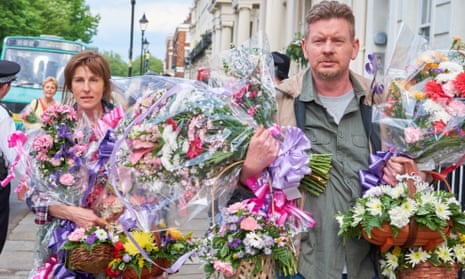You might have thought that all the Diana stuff would be over now, the actual anniversary having passed. But no, they’re milking this one for every last drop. Drama this time, Diana and I (BBC2), about the impact of her death on four individuals, in the week following the car accident in which she died. Four moons, separate but affected by the same gravitational forces, as they orbit death star Diana.
Teenage Jack has just lost his own mother, who died on the same day as the woman she idolised. Plus, Jack has other things on his plate – his sexuality, his dad’s new marriage (to another big Diana fan as it happens – he seems to attract them). Meanwhile, Michael is a thrusty young journalist, honeymooning in Paris when the biggest story of his life presents itself. New Mrs Michael is not best pleased; new husband chasing French chauffeurs along the backstage corridors of (presumably) the Ritz wasn’t part of the romantic honeymoon plan.
Then there is Mary in Glasgow, whose florist business isn’t going so well; she is cold-calling the recently bereaved in the hope of some trade. A devout republican, she is unmoved by the death of the most famous woman in the world; instead she sees a business opportunity – plus a rare chance of a road trip down south to get away from her cantankerous old mum.
Finally, there is Yasmin, who is in a rubbish (and arranged) marriage to a failing businessman. Yasmin and her daughter cannot even watch the news coverage because the bailiffs come for the telly. Time for Yasmin to get out.
Yes, there are plenty of nods to the Princess of Wales’s own life. Not just in the unhappy marriages and separations, the breaking free and the finding of new loves. But also with the intrusive press (boo) incapable of seeing that beyond the news story there is a personal tragedy. And with a general sensitivity towards the oppressed and the misunderstood.
In some ways it is cleverly done – an exploration of an extraordinary and unprecedented collective reaction through four individuals’ stories, taking in grief in its different guises (when someone you know dies but also but when someone you think you know and who still means something to you dies): love, marriage, fame, work, greed, ambition and chance. With some nice performances from a starry cast, including Tamsin Greig, Gemma Jones, Neil Morrissey and Tuppence Middleton. But there is something unsurprising – obvious even – about the characters they play. So the Asian woman is downtrodden by her abusive, sexist husband; sensitive Jack and his nice sensitive neighbour are gay; Glaswegian Mary is hard and business-minded (until her soft centre emerges); and the journalist – all the journalists – are heartless, selfish bastards.
And as a drama it is frustrating and unengaging, lacking cohesion and momentum, because of the way it jumps about from story to story to story. Just as you are beginning to know Yasmin and get involved with what is going on in her life, you are whisked off to Paris to see what is going on in Michael’s, or to Glasgow, or to wherever it is that Jack lives. The result is that you do not really get to know, or become involved with any of them.
And though they do have this connection, through Diana, their paths do not actually cross. Apart from the fact that they all end up around the Hyde Park area, for the funeral, and are sometimes in the same shot. But, then, pretty much everyone was. Even me, though probably for a different reason – to gawp at something I did not understand. With my dictaphone, just in case …
I like Richard Osman’s House Of Games (BBC2). Well, I like Richard Osman, even if he probably should be investigated by the Competition and Markets Authority for his stealthy takeover of both the TV quiz show and of teatime television itself. But he is funny and smart, and tall – and I like those things in a man.
I like the games in his house too. You might not think that the schedules need a new quiz show; but this is a particularly pleasing one. Not just questions, general knowledge, look how much I know about everything … zzzz. This is trivia, plus; it requires a bit of wit, and imagination, even, certainly silliness. So there is rhyming (how can you not like a quiz whose answers include “Bob Marley, Boutros Boutros-Ghali” and “Pauline Quirke, The Drugs Don’t Work”?). And estimating how many eggs get eaten every day in the UK. And a game called Broken Karaoke. So what is this song from 1984: LAV, TFTVFT, L … Like a Virgin, Madonna! Got it, even before Clara Amfo off Radio 1 did. That is why I like ROHOG (Richard Osman’s House of Games! I win! Again!). I’m good at it.

Comments (…)
Sign in or create your Guardian account to join the discussion